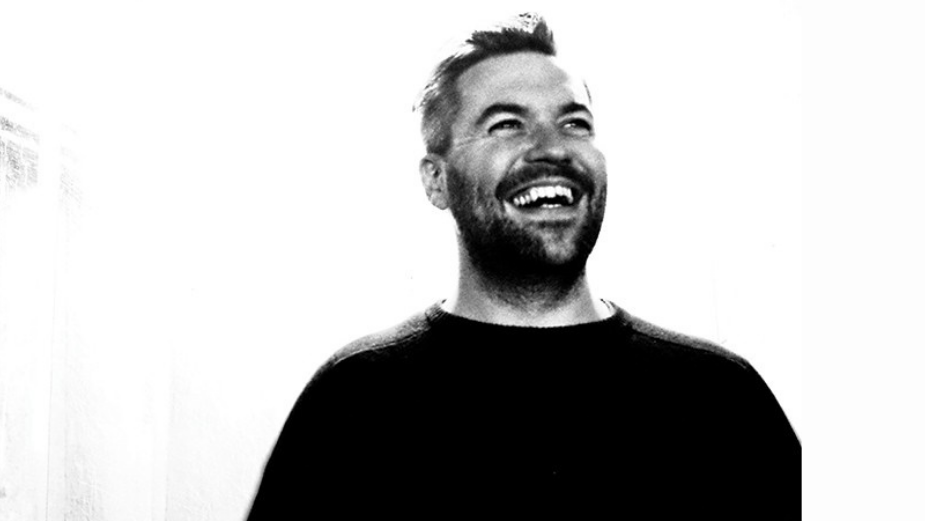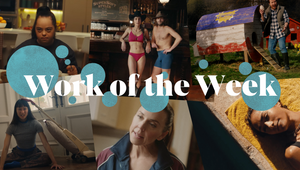
“You Don’t Get to Create Bullshit Anymore. People Want Brands to Matter”

Enhancing the emotion of moving image is fundamental to what we do at CHEAT. Behind the scenes we’re invested in innovation to do just that. Years of technical research and development, colour science and film emulation, mean we are constantly finding new ways to deepen our impact on an emotive level in this medium. This is why we’re sponsoring LBB’s 'Emotion in Advertising' strand, exploring the theme through interviews with experts who share our passion.
Uncommon London founder Nils Leonard joins LBB’s Sunna Coleman to explore how to make work that speaks to people’s hearts and why taking the risk of getting things wrong is far better than being invisible.
LBB > What was it that first inspired you to launch Uncommon?
Nils Leonard > Before this, I was at Grey for almost nine years and it was genuinely the most powerful and educational part of my career. But in my last year or so, I found myself starting to get a bit cynical for the first time ever. It started feeling a bit like Groundhog Day - I was always in the same sort of meetings and seeing the same sort of ideas - and I had this dream of the type of work we could be making. I had done some really interesting work there that was proof that all ads didn’t all have to follow the same sort of rules - projects like LifePaint and the Angina Monologues. So I realised that actually people do want to see this sort of work but it was just very hard to make it with some of the clients I had at the time.
So ultimately, I had this burning inside me to go off and create this sort of work. Because I don't think any ad creative, or any creative in any sense, wants to wake up and feel like they're just selling stuff, and that they’re not in the business of trying to move people. So I thought to myself, that's the company I need to go and start from the ground up. That’s really what fuelled the founding of Uncommon - this want to help create brands that people wish existed and this want to create things that might matter in the world, as opposed to being polluted or just being another exercise in making more shit for the gigabyte landfill.
LBB > And why do you think more people weren’t doing that?
Nils > That's a very difficult conversation to have. But I believe a few things. I think there's a lot of people trying not to fuck it up. And they’re trying not to fuck it up more than they're trying to win it or change it - I think that's really, really interesting. It’s quite easy to fall into the trap of trying not to offend anybody and I think that's become a risk averse. But I think you need to question what your role is - is it to limit damage and to try not to offend, or is it to move people and to get under their skin and to provoke them? And I think that's harder. It involves putting yourself out there, which sometimes doesn't work so it involves a certain ambition and level of not taking things personally when that does happen. So a lot of people just try to stay away from that.
I also think that our industry, without knowing it, might be teaching people dependency and the safe way to do things. We know how to have 30 beautiful years of earning money and being alright. But I've always hated the sentiment that the idea of a great career is an art of balance - I just can't abide that. I don't think that's a creative spirit. I want to work with people who want to make a meaningful impact.
LBB > So Uncommon really became what you set out to make it and it is renowned for creating work with the power to move people. What would you say is the secret to your success and what elements led to you being crowned Campaign’s Independent Agency of the Year?
Nils > First of all, that's really kind and thank you for recognising that! That is awesome. I'm genuinely moved by what Uncommon has become because it's kind of a myth until it does happen. In terms of being named Independent Agency of the Year, I genuinely put that down to having a very, very clear and courageous point of view, which is that we're trying to make brands that matter. We're trying to have a relationship in the world that is different. And we're probably not for people who don't want to do that.
We’ve had to be incredibly self-selective and all the work we made very early doors was super clear about that - it was all highly charged and the strategies behind it all were emotionally rooted. Because of that we’ve attracted more of the same type of client. You might not like all our work, but I would argue that we've not made bad or quiet work.
In a previous life I had a ‘win, lose or draw’ chart on the wall to track clients and I used to think it was awesome. And then I realised that's not awesome really, because I'm just trying to win, I'm not thinking about whether the client is a cultural fit for us, or whether they're going to make work that embodies our view of the world. Now, I try to only work with partners who have the scale and ambition that we do.
LBB > In your opinion, what would you say is the most common downfall that brands make when it comes to advertising and emotion?
Nils > I think there's two strategies in whether you want to try and move people. The first is whether you’re going to try to move their head and the second is whether you’re going to try to move their heart. The majority of advertising chooses to move people's heads with researched insights, information and rational questions. So that next time they shop, their heads might think of them.
It's far harder to have the conversation around trying to make people feel something. But, if you win their hearts, I'd argue you win their heads as well and so I think we've always gone for the latter.
But you have to consider whether you really want to move people. Do you really? Because I don't think a lot of people do. I get that advertising is about delivering people a message but I think it's a very different question to ask about how you want them to feel when you tell them that. I think some people think emotion is offensive. But they’ll never say they don’t want to move people, they'll say they just think it should feel slightly warmer - but what they mean is: “can we take the edges off it please?” because they find it scary and unnerving that the ad is making them think about deep stuff.
When you start a brand you get to go out into the world and decide who you want to be. Are you going to go out and try to be the least offensive you can be, or are you going to stand for something. So whenever we get a new brief, the conversation is usually around the CEO or founder saying they want to make a dent in the world, and it’s our job to find the best way to articulate that in a way that might move people.
LBB > So is there an element of having to open a lot of clients’ eyes when they first come to you to show them that there is a more impactful way of delivering their ideas?
Nils > That's a really good question. I think ITV is the best example of that. I think we've both grown in incredible ways as a result of our relationship. ITV CEO Carolyn McCall had this huge energy from day one and our ambition for what the company should be was super clear from the start. So we made some early work that had scale and was emotional, but it was when we really got under the skin of it and thought about how to make things really, really matter in life, that’s when we hit upon things like Britain Get Talking.
When we put that idea on the table to stop national television and give 12 million people that time back, it was such a powerful moment because ITV instantly got it, and not only that but a day later, we were already making it and we were in conversation with producers and talent. It’s very inspiring to see an organisation that does this all day, every day, and can just pivot and get things done. From that, suddenly their confidence and bravery in their own footprint in this culture grew. In turn, our belief in our ability to make that sort of work grew too.
Hell or Habito is probably one of our longest running ideas and it's badass! It's got people getting their lungs torn out by horrible mortgage brokers… So I think, again, that's another statement of this level of trust and ambition that swings both ways with some of our best partnerships. Everyone talks about having clients but I think the idea is that we should have partnerships - that's a sign of working with excellent people and it leads to growth.
LBB > What are some more of your favourite examples of emotion being used well within advertising?
Nils > Recently I think our Build A Life campaign for B&Q was quite moving. We've never spent so much time in our homes and yet, we've never wanted to progress more but been unable to. It really resonated with people, to the point where someone wrote a Tweet - which I've now got on my desktop - which was: “Why the fuck am I crying over a B&Q ad?”
I also love Burberry’s Singing in the Rain ad that’s just dropped, simply for being gorgeous and glorious, and it feels cool and badass.
LBB > Why is it even more important at a time like this for brands to start focusing more on emotion?
Nils > It's easy to say it's never mattered more but the truth is, it’s always mattered. When you advertise, you're letting people know you exist, and you're letting people know why. I think it’s a case of we've all never understood brands more, right? So we look under the lens of them. We understand their working practices, we understand their hires - it’s public knowledge now. So I don't think you get to create bullshit anymore. People want brands to matter. If you take the old rhetoric that most people don't like advertising, well I do think they like brands, but only some of them. Three quarters of brands could disappear from our shelves and no one would care. That's an actual statistic.
So I think it's critically important that you move people and engage them and talk to them. The rewards are far larger for those brands. Particularly in this world right now which is a very emotional, tender and beautiful space. Why wouldn't you want to play a part in this moment? I think it's an opportunity.
LBB > What role do you feel that colour/grade and sound/music can play when it comes to eliciting emotions?
Nils > Colour and grading are like the body language of a brand. They tell us how to feel about a moment. They tell us whether this thing has scale or whether it's everyday. They tell us whether it's cold and we should be detached, or whether we need to feel warm and fuzzy.
With B&Q Build A Life we were a bit naughty because we shot a load of that footage but then played it through a VCR and reshot it. Because it’s programmed somewhere inside us to respond to old footage as a memory of ours. It’s a clever little trick. With light and colour I think you can really make a difference.
And music we take incredibly seriously at Uncommon. We often have music in meetings before we've got scripts. We experiment and think “imagine your brand felt like this or sounded like this?” And we all know what that means without even saying it. That stuff is incredibly powerful.
People often make the mistake of over-strategising and obsessing about the mechanics when it comes to music. Just play music until it hurts you. Play music until you feel it and you want to look away from the screen because something just messed with you. That's the music strategy.
So colour/grade and sound/music is not something to wait to the end for. It needs to help lead the whole direction and that’s when it feels most natural and impactful. We cut to sound first. Any moment you can think of from a film where music has played a powerful part, is engineered around the track and its pace. The shape of the cut is dictated by the music. Otherwise you can get very mechanical ads.
LBB > When it comes to social media content, what are the challenges associated with capturing people’s emotions in such a short space of time?
Nils > A hopeful way to look at what social media is doing is that it's not shortening our attention span. It's removing our impatience for shit content. It’s giving us clues about how people want to digest stuff now. It's just got to speak to them and be constantly moving and emotive and powerful.
I don't think that this stuff is a threat to what we do at all. I think it's engineering a new generation, as well as talent that says, “If I can entertain you in six seconds, imagine what I can do in an hour.” Some of that stuff they share is just about capturing a moment and a mood. How advanced is it that we can just #mood, and everyone understands what we mean? What a lovely sentiment. And so I think it's a really good thing.
LBB > You have a lot of great insight into emotion. Where did you pick this all up? Is this something you actively research or have you always been quite attuned to it?
Nils > Both - I'm obsessed with it. When you love stuff, you should collect it. I make notes all the time. I watch films like holidays. So I've watched Interstellar 22 times... I loved Sorrentino’s The New Pope - just a few seconds in and there are 30 nuns dancing in a room around a neon cross to Good Time Girl. You're like, what is fucking happening here? Borderline offensive, but I'm in. I'm all in. When something moves me I kind of like to analyse it. I'm in love with the subject matter of it.
Growing up I loved film and I loved books. I wanted to be an artist, but I didn't understand how, and my version of art was something that might move you. So I fell in love instead with the cinema ads of that time, that particularly at the time, were big two-minute overseas fragrance ads. They were weird and didn't have storylines but they just moved you. There was just a bit of music or a place that they took you to. I remember thinking that advertising might be a slightly different version of art. That's hopefully what my business is now.
I’d love to move into experience design. I'd like to make the Olympic torch. What's the most emotional version of the Olympic torch? I find it interesting thinking about whether there could be one that everyone could feel was theirs. It can be tempting to remove design from emotion but it's the same thing again - the best designs move us. Why do we all want an iPad?
LBB > Lastly, what emotions are you just bored of seeing and which emotions do you wish would be explored more?
Nils > Revenge. Anger. Rage. There are a lot of archetypes in advertising but there's one that no one ever talks about, which is nemesis. Now, I don't think any brand should just be the continual vengeful force but it’s alright to go out as a brand and be badass. On occasion, that is fucking awesome. Brewdog does it very well.
I think a lot of that has gone missing. I miss music that people don't expect, like metal or drum and bass - hard, powerful music. You see it used in film all the time - it's the theatre of it that moves and propels you. And yet in advertising, we round it all off. People aren’t taking chances and they’re not being honest.
Remember the Kendall Jenner Pepsi ad that everyone loves to jump up and down on? I know where they came from. They were in a meeting at some point and someone just wanted to make a difference and be out there. So someone said the right thing and they all got moved by a conversation, but then when they put the gloves on, they fucked it up. That's my honest opinion. I'd rather people make more howlingly powerful mistakes that we are still moved by in some way rather than land somewhere in the fucking middle.
However, there is a worse crime than that, which is simply being invisible. When your ad is just familiar and the constructs are familiar. I think that's a wasted opportunity. All the money, all the time, all the talent, to make something that doesn't want to touch the sides - I think that is offensive.
LBB > Any parting thoughts?
Nils > Try to think beyond the product you’re selling. If a car brand starts to have a conversation around pollution or around asthma, then suddenly you're going to be more emotional because you're already dealing with something that actually matters in our lives - not just trying to flog me a car. I know that sounds incredibly easy to say and strategists will be reading this thinking, obviously. But I think we get lost. And I think we just respond to briefs as they come. The more we can create actual useful experiences that make a positive impact, the more chance we have of being emotional.
This industry used to scratch far harder at those things than it is doing now. Think about why you’ve made your product. Most brands don't wake up and go: “We're just going to slightly optimise our product to sell like robots.” That's not true. There are great, great people running these companies and they’re creating things because they feel the world needs it. And that's a really beautiful thing but the message is getting lost somewhere along the way. The message is where the emotion lies.













